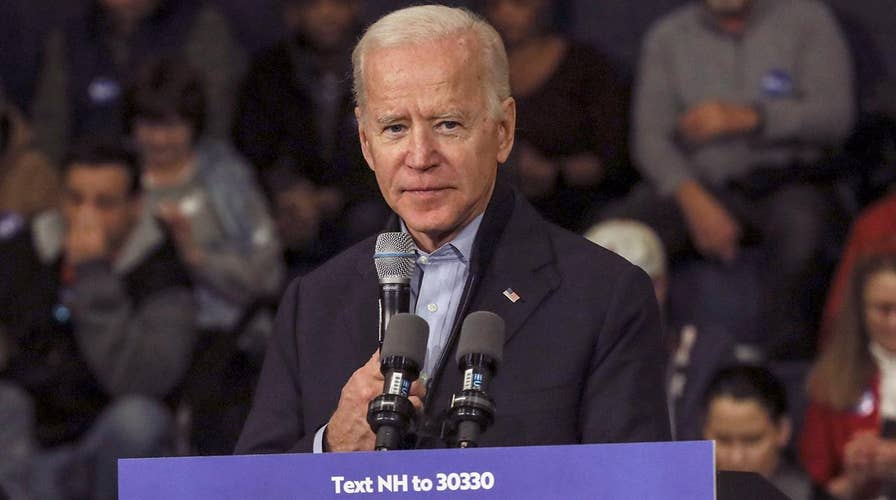One-term plan? Biden denies talking to aides about re-election
Former Vice President Joe Biden denies planning for one-term presidency; Fox News correspondent Peter Doocy reports.
Former Vice President Joe Biden remains Democratic primary voters’ preferred presidential candidate, as a Fox News Poll released Sunday shows more think he is capable of beating President Trump than feel that way about any of his main competitors -- and he performs best in potential 2020 matchups. In addition, Biden has the largest number of Democrats, as well as voters overall, saying his positions on the issues are “about right.”
Seventy-seven percent of Democratic primary voters think Biden can beat Trump in next year’s presidential election, up from 68 percent in October. Smaller majorities say the same about Bernie Sanders (60 percent), Elizabeth Warren (59 percent), and Mike Bloomberg (55 percent). Forty-eight percent think Pete Buttigieg can win -- an 18-point jump from 30 percent in October.
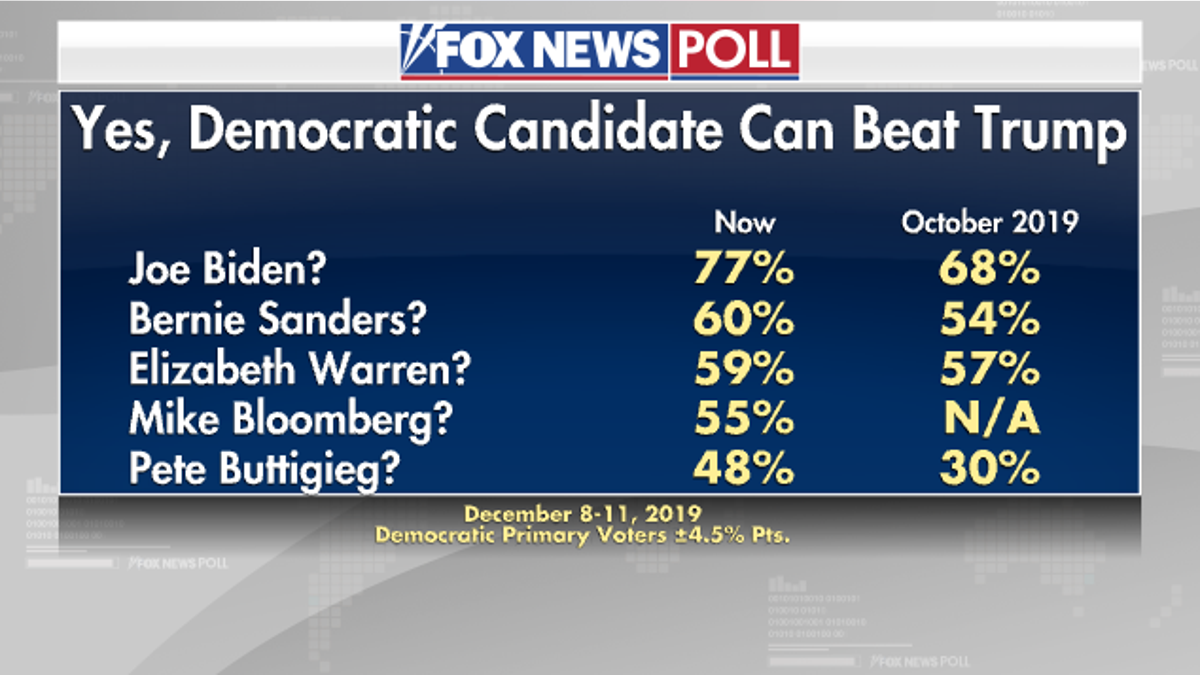
More Democratic primary voters think Biden’s “about right” on issues (64 percent) than Buttigieg (56 percent), Warren (53 percent), Sanders (49 percent), and Bloomberg (47 percent). Seventy-eight percent of Republicans say Trump’s positions are “about right.”
CLICK HERE TO READ THE POLL RESULTS
Running down the Democratic race: Biden leads with 30 percent, followed by Sanders at 20 percent. Warren returns to third with 13 percent, down from a high of 22 percent in October.
Next, it’s Buttigieg (7 percent), Bloomberg and Amy Klobuchar (5 percent each), Tulsi Gabbard and Andrew Yang (3 percent apiece), and Cory Booker (2 percent). The remaining candidates garner 1 percent or less.
Biden’s lead comes mostly from voters ages 45 and over (up by 26 points), moderates/conservatives (+20), and non-whites (+13). Sanders wins among voters under 35 (+19) and white men (+1).
But don’t place any bets just yet. Nearly half of those currently backing a candidate, 49 percent, say they could change their mind.
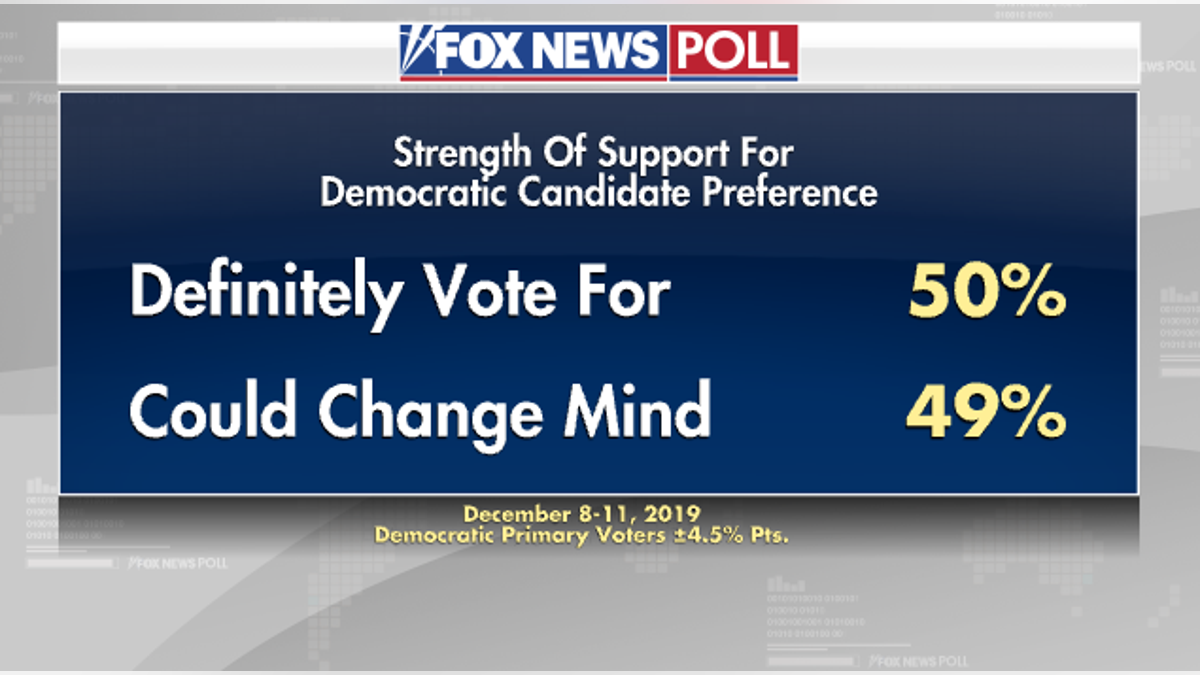
"Biden's support has been the consistent feature of this race," says Republican pollster Daron Shaw, who conducts the Fox News Poll with Democrat Chris Anderson. "It's time for consultants and pundits to seriously consider the possibility his backers aren’t simply being strategic and may be more committed than we heretofore suspected."
Sanders and Warren have experienced fairly significant swings in support, while Biden’s numbers have barely budged since March, staying between 29-35 percent. At the same time, his current 10-point edge over Sanders is down from a 19-point lead in June.
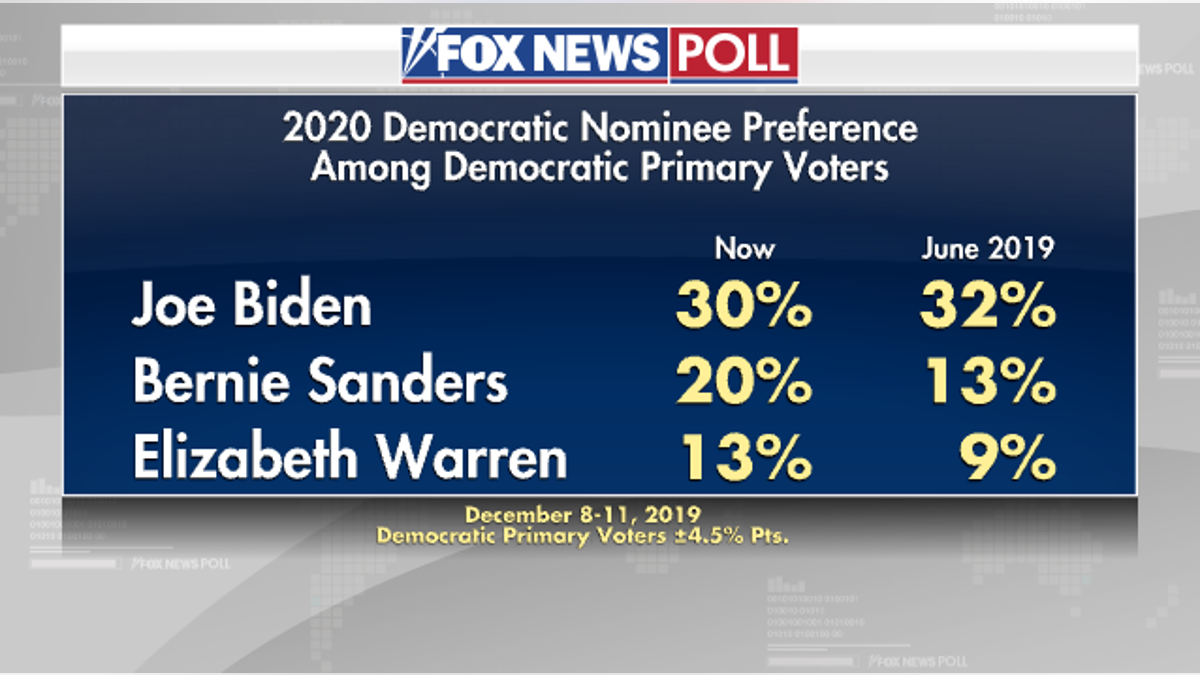
Democratic primary voters divide when choosing between a candidate who will “restore the political system” to the way it was before Trump (48 percent) and one who will “fundamentally change how the political system works” (45 percent).
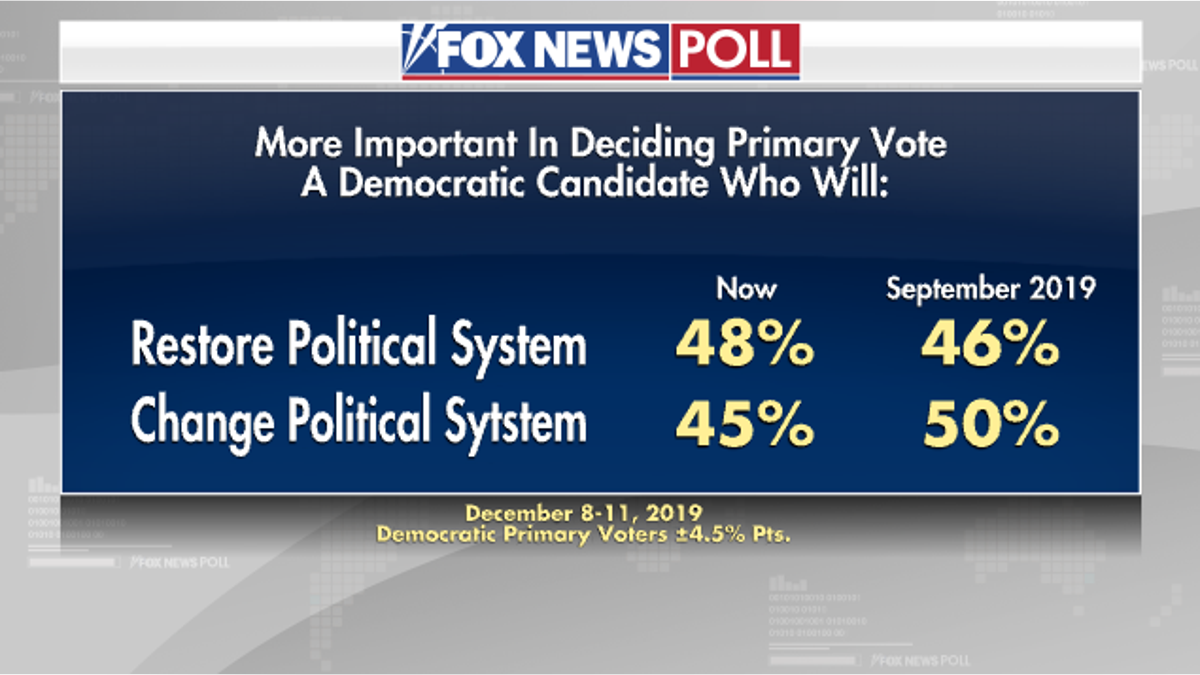
Those wanting to restore the system go for Biden (39 percent) over Sanders (14 percent) and Warren (11 percent). Those wanting big changes put Sanders (26 percent) and Biden (23 percent) on top, while Warren trails (14 percent).
Fewer Democratic primary voters are satisfied with their field of candidates now (63 percent) than were in late October (69 percent). Since then, Bloomberg and Deval Patrick joined the race, while Steve Bullock, Kamala Harris and Joe Sestak dropped out.
Since late October, support for Warren is down across the board, with the notable declines among those with a college degree (-13 points), those ages 45+ (-12), and women (-11 points).
CLICK HERE TO GET THE FOX NEWS APP
“The most likely explanation for Warren’s drop is some primary voters souring on 'Medicare-for-all',” says Anderson. “The issue could be a real drag for the Democratic nominee in the general election. The more it’s debated, the more voters who care most about beating Trump seem to realize her push for 'Medicare -for-all' is bad politics at this moment in time.”
Currently, 54 percent of Democratic primary voters favor moving to a government-run system in lieu of private health insurance, down from a high of 65 percent in October. Large numbers like the idea of allowing every American to buy into Medicare if they want (78 percent) and making minor changes to Obamacare (67 percent).

Among all voters, majorities favor "Medicare-for-all" who want it (66 percent) and Obamacare (53 percent). Over half (53 percent) oppose an entirely government-run health care system. In addition, 68 percent favor Warren’s proposed 2 percent “wealth tax,” including 83 percent of Democrats and 51 percent of Republicans.
About 4 voters in 10 think Biden’s (42 percent), Buttigieg’s (37 percent), and Trump’s (39 percent) positions on the issues are “about right,” while over half think Sanders’ (56 percent) and Warren’s positions (52 percent) are “too liberal.”
In hypothetical head-to-heads, Biden tops Trump by 48-41 percent and has the only lead outside the poll’s margin of sampling error.
However, Biden’s 7-point lead is his narrowest since March; this is the first time he’s been below 50 percent since July, and Trump’s 41 percent support is a record high for him in a ballot test against the former vice president.
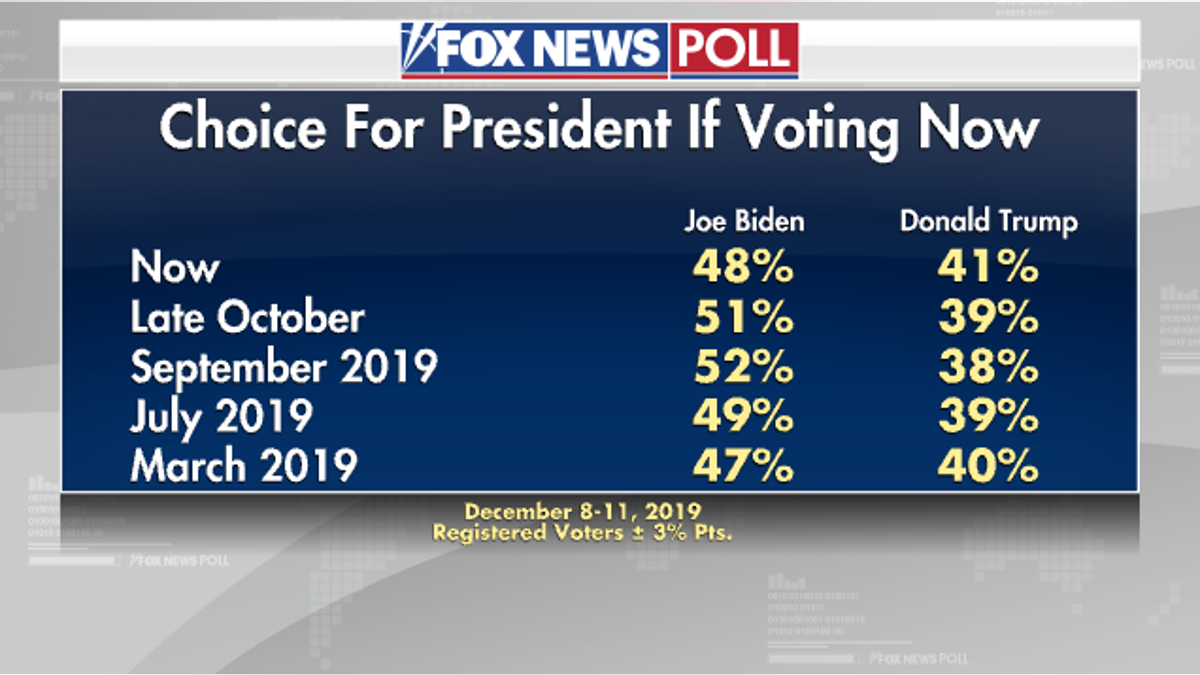
Sanders is preferred over Trump by six points (49-43) and Bloomberg is ahead by five (45-40). Warren (46-45) and Buttigieg (43-42) are each up by one point.
Biden’s advantage over Trump is driven largely by double-digit leads among women (+15 points) and non-whites (+36). Whites with a college degree go for Biden by 6 points, while whites without a degree back Trump by 12. Rural whites prefer Trump over Biden by 18 points, while suburban women favor Biden by 21.
The electorate is paying attention: 58 percent of voters are extremely interested in the presidential election, including 64 percent of Democrats and 55 percent of Republicans. At this point in the election cycle four years ago, far fewer, 32 percent of voters, said they were extremely interested (November 2015).
Conducted December 8-11, 2019, under the joint direction of Beacon Research (D) and Shaw & Company (R), this Fox News Poll includes interviews with 1,000 randomly chosen registered voters nationwide who spoke with live interviewers on both landlines and cellphones. The poll has a margin of sampling error of plus or minus 3 percentage points for all registered voters and 4.5 points for Democratic primary voters (453).






































